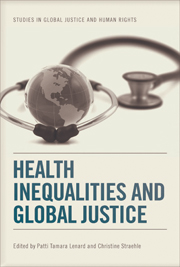Book contents
- Frontmatter
- Contents
- Acknowledgements
- Notes on the Contributors
- Introduction: Health Inequality and Global Redistributive Justice
- Part 1 A Right to Equal Health?
- Part 2 Who is Responsible for Remedying Global Health Inequality?
- Part 3 Measuring Health and Health Outcomes
- Part 4 Borders and Health
- 11 Justice and Health Inequalities in Humanitarian Crises: Structured Health Vulnerabilities and Natural Disasters
- 12 ‘Illegal’ Migrants and Access to Public Health: A Human Rights Approach
- 13 Medical Migration between the Human Right to Health and Freedom of Movement
- 14 Healthcare Migration, Vulnerability and Individual Autonomy: The Case of Malawi
- Bibliography
- Index
13 - Medical Migration between the Human Right to Health and Freedom of Movement
from Part 4 - Borders and Health
Published online by Cambridge University Press: 05 August 2013
- Frontmatter
- Contents
- Acknowledgements
- Notes on the Contributors
- Introduction: Health Inequality and Global Redistributive Justice
- Part 1 A Right to Equal Health?
- Part 2 Who is Responsible for Remedying Global Health Inequality?
- Part 3 Measuring Health and Health Outcomes
- Part 4 Borders and Health
- 11 Justice and Health Inequalities in Humanitarian Crises: Structured Health Vulnerabilities and Natural Disasters
- 12 ‘Illegal’ Migrants and Access to Public Health: A Human Rights Approach
- 13 Medical Migration between the Human Right to Health and Freedom of Movement
- 14 Healthcare Migration, Vulnerability and Individual Autonomy: The Case of Malawi
- Bibliography
- Index
Summary
INTRODUCTION
Medical migration – the mass movement of medical professionals from the developing to the developed world – is widely seen as one of the most profound problems facing health systems in the poorest countries of the world. Skilled health-workers leave high disease burden areas with acute staff shortages in order to serve patients in low disease burden regions, which are already well equipped. The result of medical migration is deepening global inequality in health.
Sub-Saharan Africa is widely regarded to be suffering the greatest crisis in human resources for health, and data suggests that the problem is likely to grow (Dovlo 2007: 42). The brain drain of health-workers escalates the severe health crises in high disease burden regions that already face a critical shortage of health personnel. World Health Organization (WHO) data show that thirty-six countries in Africa do not meet the ‘Health for All’ target of one doctor per 5,000 people. On average, there are 1.4 skilled health personnel for every 1,000 people, compared to ten in Europe and in North America (World Health Organization 2006: 98). The WHO has estimated that in order to meet the health-related Millennium Development Goals (MDGs) the number of health-workers in Africa would need to triple. Actual trends, however, run contrary to the global policy target. On the one hand, data from OECD countries show that, in particular in the English-speaking high-income countries, 20–35 per cent of the practising doctors are foreign-trained (OECD 2010).
- Type
- Chapter
- Information
- Health Inequalities and Global Justice , pp. 230 - 246Publisher: Edinburgh University PressPrint publication year: 2012



